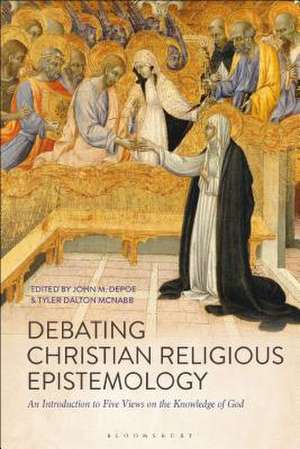Debating Christian Religious Epistemology: An Introduction to Five Views on the Knowledge of God
Editat de John M. DePoe, Tyler Dalton McNabben Limba Engleză Paperback – 5 feb 2020
| Toate formatele și edițiile | Preț | Express |
|---|---|---|
| Paperback (1) | 161.32 lei 6-8 săpt. | +51.90 lei 4-10 zile |
| Bloomsbury Publishing – 5 feb 2020 | 161.32 lei 6-8 săpt. | +51.90 lei 4-10 zile |
| Hardback (1) | 498.82 lei 6-8 săpt. | |
| Bloomsbury Publishing – 5 feb 2020 | 498.82 lei 6-8 săpt. |
Preț: 161.32 lei
Preț vechi: 196.65 lei
-18% Nou
Puncte Express: 242
Preț estimativ în valută:
30.87€ • 32.31$ • 25.69£
30.87€ • 32.31$ • 25.69£
Carte tipărită la comandă
Livrare economică 01-15 aprilie
Livrare express 22-28 februarie pentru 61.89 lei
Preluare comenzi: 021 569.72.76
Specificații
ISBN-13: 9781350062733
ISBN-10: 1350062731
Pagini: 264
Dimensiuni: 156 x 234 x 25 mm
Greutate: 0.43 kg
Editura: Bloomsbury Publishing
Colecția Bloomsbury Academic
Locul publicării:London, United Kingdom
ISBN-10: 1350062731
Pagini: 264
Dimensiuni: 156 x 234 x 25 mm
Greutate: 0.43 kg
Editura: Bloomsbury Publishing
Colecția Bloomsbury Academic
Locul publicării:London, United Kingdom
Caracteristici
Covers the five main epistemic viewpoints: classical evidentialism, phenomenal conservatism, proper functionalism, covenantal epistemology and traditions-based perspectivalism
Notă biografică
John M. DePoe is Academic Dean of the Schools of Logic and Rhetoric at Kingdom Preparatory Academy, USA.Tyler Dalton McNabb is Post-Doctoral Fellow at the University of Macau, Macau.
Cuprins
General Introduction1. Debating Classical Evidentialism, John M. DePoe (Marywood University, USA)2. Debating Phenomenal Conservatism, Logan Paul Gage & Blake McAllister (Franciscan University and Hillsdale College,USA)3. Debating Proper Functionalism, Tyler Dalton McNabb (Houston Baptist University, USA)4. Debating Covenantal Epistemology, K. Scott Oliphint (Westminster Theological Seminary, USA)5. Debating Tradition Based Persepectivalism, Erik Baldwin (Indiana University, USA)BibliographyIndex
Recenzii
There is perhaps no issue more debatable, and yet simultaneously more fundamental, than the question of what is it to know God. Debating Religious Epistemology is both a fantastic introduction and a great model of charitable but spirited dialogue about this fascinating topic.
DePoe and McNabb succeed in doing what can be especially difficult; they have managed to produce something that is both clarifying and insightful. Their book will serve as a much-needed point of reference for those interested in discussions of religious epistemology. This highly accessible contribution will be beneficial for students and scholars, alike.
"Many people-including Christians and scholars-are unaware that there is a growing treasure trove of philosophical explorations in Christian epistemology: the study of how one might know, or rationally believe, that Christianity is true. In an engaging debate format, this book provides up-to-date explanations and defences of some of the main views in contemporary Christian epistemology. A careful study of the book will be personally fruitful for Christians considering the rationality of their own beliefs and will also have apologetic value in response to those who think Christian belief is stupid and irrational."
Both in-depth and accessible, this book is a valuable resource for anyone interested in the epistemology of religion and its application to Christian belief.
DePoe and McNabb succeed in doing what can be especially difficult; they have managed to produce something that is both clarifying and insightful. Their book will serve as a much-needed point of reference for those interested in discussions of religious epistemology. This highly accessible contribution will be beneficial for students and scholars, alike.
"Many people-including Christians and scholars-are unaware that there is a growing treasure trove of philosophical explorations in Christian epistemology: the study of how one might know, or rationally believe, that Christianity is true. In an engaging debate format, this book provides up-to-date explanations and defences of some of the main views in contemporary Christian epistemology. A careful study of the book will be personally fruitful for Christians considering the rationality of their own beliefs and will also have apologetic value in response to those who think Christian belief is stupid and irrational."
Both in-depth and accessible, this book is a valuable resource for anyone interested in the epistemology of religion and its application to Christian belief.
